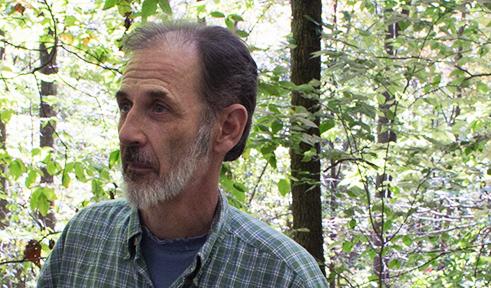Glenn Matlack

Education
Ph.D. University College of North Wales, Bangor, UK 1984
Research
Faculty Research Focus Area: Eastern Deciduous Forest Ecology
Current and Recent Student Research Projects
- Roadside tree microclimate and pavement effects
- Interactions of plant mobility, habitat turnover, and habitat spatial structure (modeling)
- Long-term impacts of land use in forests of SE Ohio
- Urban Forests: Effects of street trees on urban microclimate and hardscape
- Plant invasions as a community assembly process
- Interactions of clonal growth and local environmental heterogeneity
- Dispersal of forest herbs by animals
Courses
College of Arts and Sciences Outstanding Teaching Award 2008
- PBIO 1090 Americans and their Forests (opens in a new window)
- PBIO 4350/5350 Plant Population Biology (opens in a new window)
- PBIO 3220/5220 Tropical Ecology
Departmental Service
- Department Promotion and Tenure Chair
- College of Arts & Sciences Curriculum Committee
- Faculty Senator
Professional Service
- Associate Editor, Journal of Ecology
- Biodiversity Management Planning, Wayne National Forest
Selected References
Monsted J and GR Matlack. 2023. Human ecology of forest in an extraction-shaped landscape: Economic and demographic drivers of land use change in the Ohio Valley over 220 years. Regional Environmental Change, 23:101
Matlack, G.R., I. Khoury, B. Naik. 2022. Tree canopy macrostructure controls heating of asphalt pavement in a moist-temperate urban forest. Urban Ecosystems, 25, pages 967–976.
Monsted J and GR Matlack. 2021. Shaping the second-growth forest: fine-scale land use change in the Ohio Valley over 120 years. Landscape Ecology, in press.
Glick, M.D. and GR Matlack 2020. Tree-base microsites contribute to physical heterogeneity and herb community structure in a temperate-deciduous forest (opens in a new window). Journal of Vegetation Science, online.
Holmes MA and GR. Matlack. 2019. Non-native plant species show a legacy of agricultural history in second-growth forests of southeastern Ohio. Biological Invasions (opens in a new window), 21, 3063–3076.
Holmes MA and GR. Matlack. 2019. Spatial structure develops early in forest herb populations, controlled by dispersal and reproductive schedule (opens in a new window). Oecologia 189: 951-970.
Redwood, M.E. G.R. Matlack, and C.D. Huebner. 2019. Seed longevity and dormancy state in an invasive tree species: (opens in a new window)Ailanthus altissima. Journal of the Torrey Botanical Society, 146(2): 79–86.
Redwood, M.E. G.R. Matlack, and C.D. Huebner. 2018. Seed longevity and dormancy state in an invasive tree species: Ailanthus altissima. Journal of the Torrey Botanical Society, in press. DOI not available yet. A copy will be provided on request.
Holmes, M.A. and G.R. Matlack. 2018. Assembling the forest herb community after abandonment from agriculture: long-term successional dynamics differ with land-use history (opens in a new window). Journal of Ecology, 106:2121–2131.
Redwood, M.E., G.R. Matlack, and C.D. Huebner. 2018. Seed longevity and dormancy state suggest management strategies for garlic mustard (Alliaria petiolata) and Japanese stiltgrass (Microstegium vimineum) in deciduous forest sites (opens in a new window). Weed Science, 66: 190-198
Holmes, M.A. and G.R. Matlack. 2017. Forest structure develops through time: physical and biotic heterogeneity following abandonment from two forms of agriculture (opens in a new window). Forest Ecology and Management, 404: 55-64.
Niederhauser EC and G.R. Matlack 2017. Secondary dispersal of forest herb seeds from raccoon dung: Contrasting service by multiple vectors (opens in a new window). Plant Ecology, 218: 1135-1147
Holmes, M.A. and G.R. Matlack. 2017. Agricultural history drives structure and tree-species composition of second growth forest over 100 years in southeastern Ohio, USA (opens in a new window). Journal of Vegetation Science, 28: 736–746.
Niederhauser, E.C. and G.R. Matlack 2017. Do deer and raccoons defecate in the right place? Fitness consequences of vertebrate seed dispersal for a deciduous forest herb. Oecologia, 183: 727-737
Holmes, M.A. and G.R. Matlack. 2017. Forest structure develops through time: physical and biotic heterogeneity following abandonment from two forms of agriculture. Forest Ecology and Management, in press.
Niederhauser EC and G.R. Matlack 2017. Secondary dispersal of forest herb seeds from raccoon dung: Contrasting service by multiple vectors. Plant Ecology, in press.
Matlack G.R., Naik B., Khoury I., Sinha G. 2016. Trees and pavement: a review of the effect of roadside trees on pavement performance and driving condition. Report to the Ohio Department of Transportation; Dec. 8, 2016. 54 pages.
Redwood, M.E., G.R. Matlack, C.D. Huebner. 2016. Seed longevity and dormancy state in a disturbance-dependent forest herb, Ageratina altissima. Seed Science Research, 26: 148 – 152
Niederhauser, E.C. and G.R. Matlack. 2016. Do deer and raccoons defecate in the right place? Fitness consequences of vertebrate seed dispersal for a deciduous forest herb. Oecologia, in press.
Niederhauser, E.C. and G.R. Matlack. 2015. All frugivores are not equal: Exploitation competition determines seed survival and germination in a fleshy-fruited forest herb. Plant Ecology, in press.
Matlack, GR. 2015. Managing fire in the mesic deciduous forest when fire history is unknown: response to Stambaugh et al. Conservation Biology, 29: 947-949.
Schweizer, P.E. and G.R. Matlack. 2014. Factors driving land use change and forest distribution on the outer coastal plain of Mississippi, USA. Landscape and Urban Planning, 121: 55–64.
Matlack, G.R. 2013. Reassessment of the use of fire as a management tool in deciduous forests of eastern North America. Conservation Biology, 27: 916-926.
K.E. Hougen and G.R. Matlack. 2012. Long-term effects of land use history on species composition in post-industrial forests of southeastern Ohio, USA. Forest Ecology and Management, 269: 279–292..